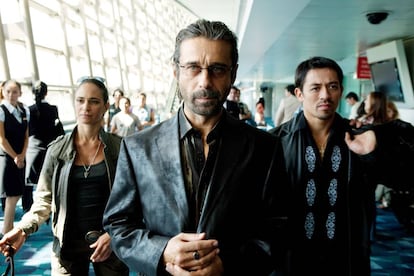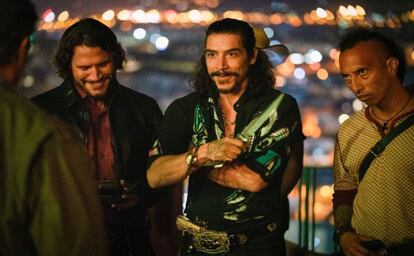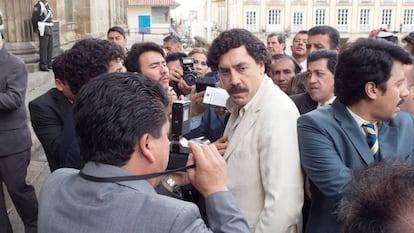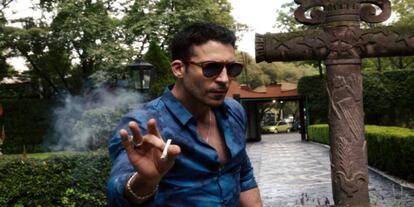Latino drug dealers: The clichéd role that Spanish-speaking actors willingly accept
In the Trump era, many observers warn against feeding the stereotype of the Hispanic narco criminal

Thirty-seven years after his debut on the big screen, John Rambo aka Sylvester Stallone still takes no prisoners. In his latest film, Rambo: Last Blood, the Vietnam veteran embarks on a killing spree as he battles the Martínez brothers’ Mexican drug cartel. The brothers are, of course, psychopathic, bloodthirsty and one-dimensional as could be expected of a movie that has been dubbed “a Trumpian fantasy,” in reference to US President Donald Trump. All in all, the movie is an ode to white justice triumphing over Latino evil and executed beyond the boundaries of the law, with the requisite fallout of untold death and destruction.
But Óscar Jaenada and Sergio Peris-Mencheta, who play the Martínez brothers, are not in fact from the Mexican towns of Tijuana or Monterrey, but from the Spanish cities of Barcelona and Madrid, respectively. They are the most recent in a long line of actors who have crossed the Atlantic from Spain in order to play the Latin American villain in Hollywood. First we had the Nazis, then the Russian communists and the jihadists; now we have the Latin American drug lords with a Spanish face.
The dialogue and imagery of cartel movies associates Latino identity with inherent, pure evil again and again
Héctor Tobar, journalist
The international success of Narcos, the series that ushered Pablo Escobar into the mainstream of popular culture, has inspired the US entertainment industry to explore the narcotics underworld. Spanish actors such as Miguel Ángel Silvestre, Javier Cámara and Alberto Ammann (who is Spanish-Argentine) have had to work hard on their accent in order to join the ranks of those signing up to the cliché.
Javier Bardem has done so twice: in Collateral, which was one of his first Hollywood movies, and in Loving Pablo, the most recent portrayal of the head of the Medellín cartel, with Jaenada also in the cast.
Jaenada’s brother in Rambo: Last Blood, Sergio Peris-Mencheta, is currently playing a Mexican-American narco in the series Snowfall, which depicts the 1980s crack epidemic in Los Angeles. Then there is Carlos Bardem, who also contributed to the collection of Escobar films in Paradise Lost. When it comes to this model, the road has been traveled by a wide range of Spanish actors, from the reluctant Luis Tosar (Miami Vice) to Jordi Mollà, who played a drug lord in Blow, Bad Boys II and Colombiana.

Dubbed “the new Westerns” by Oscar-winner Benicio del Toro, the narco genre has become an unprecedented way into Hollywood for Spanish-speaking actors at the cost of playing what amounts to a caricature. “Every time I see one of these actors in one of these roles, it strikes me as a pretty ridiculous use of the character,” says film critic Jordi Costa, who believes that these jobs don’t do credit to the talents of those taking them.
Of course, for a Spanish actor, it is almost impossible to refuse such roles; their work will get international exposure and the jobs are well paid. Also to be considered is the increasing precariousness of the Spanish film industry, even for its most successful actors. According to Peris-Mencheta, for example, the income he receives from such roles in the US allows him to pursue his theater projects back home without having to depend on state subsidies or the criteria of the theater itself.
But the risk of becoming typecast is high. “If I consider Jordi Mollà’s US career, that is the cliché that comes to mind. He will have to figure out for himself how far it works in his favor or is profitable, but it’s clearly a stereotype,” notes Costa.
Only the studio bosses themselves can say why they pick Spanish actors to play the roles of Latin American narcos, but it does suggest an element of whitewashing – the practice of giving white actors preferential treatment in auditions.

In recent years, while ethnic minorities have complained about whitewashing, the studios have justified their choices by indicating sales at the box office. Stars such as Scarlett Johansson (Ghost in the Shell) and Jake Gyllenhaal (Prince of Persia) have been criticized for taking roles that should have been given to actors of, in Gyllenhaal’s case, Iranian origin and in Johansson’s case, Asian origin. Responding to the criticism, Gyllenhaal said he wasn’t able to go back in time to make a different decision.
But not all Spanish-speaking actors have gone down the narco route. The clip of Argentina’s Ricardo Darín turning his back on Hollywood money and glamour during a television interview in 2013 went viral.
“They offered me the role of a Mexican drug trafficker [in The Fire of Vengeance] and I didn’t want to do it,” he says. “Are all drug traffickers Latin Americans? Given that the United States is the country with the highest consumption of drugs on the face of the Earth… I didn’t like it,” he said.
Directed by Tony Scott and starring Denzel Washington, the film ended up casting the US singer Marc Anthony, who has Puerto Rican heritage. At 62, Darín has still not starred in a Hollywood film.
Meanwhile, Moulin Rouge star John Leguizamo, who was born in Colombia and is now one of Hollywood’s most prolific actors, has also side-stepped the stereotype. “I don’t want to play a drug trafficker or a killer for the rest of my life. It’s not me and those are not my people,” he said at the 2015 Sundance Festival.

Jonathan Jakubowicz, the Venezuelan director of Hands of Stone about the Panamanian boxer Roberto Durán, shared an anecdote that accurately illustrates the current trend. “When the movie premiered, I asked a number of friends who run film studios if they could tell me of any other movie where the Latino star wasn’t a criminal and, honestly, none of them were able to give me an answer.”
Political repercussions
In the Trump era, the stereotype has political and social repercussions that are impossible to ignore. Almost every critic reviewing Rambo: Last Blood described it as pure propaganda for Trump’s border wall between the US and Mexico.
Abundant data highlights the fact that, within the US entertainment industry, Latin Americans are most frequently cast as working in the drug trade, either as a kingpin, a hit man or a small-time dealer. According to research carried out by the University of Southern California, 25% of Latin Americans are portrayed as criminals and 17% as poverty-stricken or low-income characters.
“Even worse, when we are portrayed, too often we’re presented as criminals and narcos,” wrote the Mexican-born director Gregory Nava, who was nominated for an Oscar for The North, in an opinion piece for the Los Angeles Times.
In the Trump era, the stereotype has political and social repercussions that are impossible to ignore
Taking into account the minimal number of Latin Americans in starring roles in the past – a mere 3% despite accounting for a quarter of the US audience – the stereotype plays nicely into the hands of xenophobes.
“The dialogue and imagery of cartel movies associates Latino identity with inherent, pure evil again and again. It’s time for Hollywood to ask: What message are we sending to the American public by asking this country’s Latino actors to act out one execution-style killing after another? ” writes the journalist Héctor Tobar in The New York Times.
“By choosing to glorify these particular stories on-screen, not only are we sending a terrible message to young Latinos, we’re also reinforcing stereotypes that have typecast Latinos as criminals for decades on TV,” wrote the journalist Patricia García in an article for Vogue.
But Spain’s Jordi Costa is not optimistic. “Only when Latin American directors get a foot in the door of Hollywood, make their own storylines and listen to their own communities, will [the stereotypes] be questioned. But I imagine it will be a while before we are free of them.”
English version by Heather Galloway.
Tu suscripción se está usando en otro dispositivo
¿Quieres añadir otro usuario a tu suscripción?
Si continúas leyendo en este dispositivo, no se podrá leer en el otro.
FlechaTu suscripción se está usando en otro dispositivo y solo puedes acceder a EL PAÍS desde un dispositivo a la vez.
Si quieres compartir tu cuenta, cambia tu suscripción a la modalidad Premium, así podrás añadir otro usuario. Cada uno accederá con su propia cuenta de email, lo que os permitirá personalizar vuestra experiencia en EL PAÍS.
¿Tienes una suscripción de empresa? Accede aquí para contratar más cuentas.
En el caso de no saber quién está usando tu cuenta, te recomendamos cambiar tu contraseña aquí.
Si decides continuar compartiendo tu cuenta, este mensaje se mostrará en tu dispositivo y en el de la otra persona que está usando tu cuenta de forma indefinida, afectando a tu experiencia de lectura. Puedes consultar aquí los términos y condiciones de la suscripción digital.









































